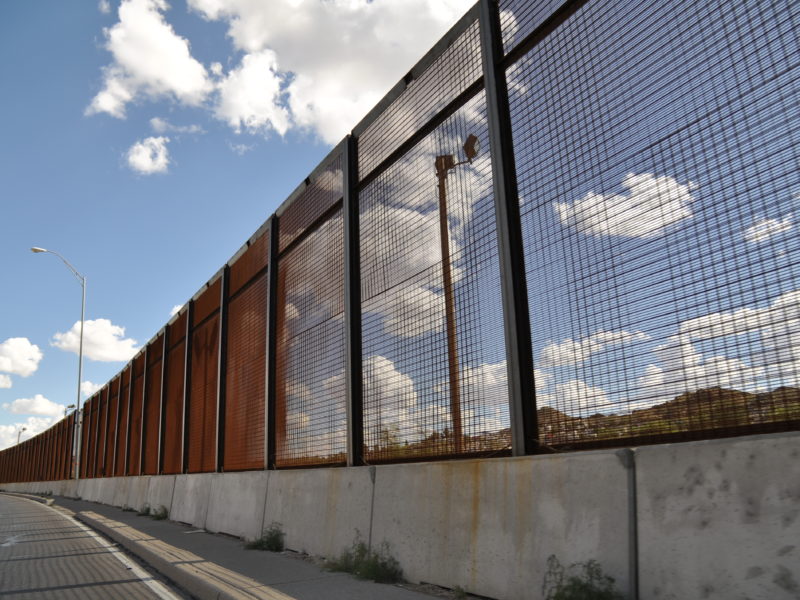IGCC Dissertation Fellow Series
Guest post by Brett McCully
An influx of immigrants at the southern border of the United States has drawn substantial media attention and poses an early challenge to the Biden administration’s hopes for comprehensive immigration reform. While the magnitude of the surge has sometimes been overstated, the current influx has led to the highest number of border apprehensions in 20 years.
For many Americans reading these headlines, a key concern is that increased immigration will mean an increase in crime. The link between immigration and crime has long been a contentious issue in American politics. Political opponents of immigration often point to sensational accounts of specific crimes allegedly committed by immigrants, particularly undocumented immigrants. In many countries, concerns about immigrants causing crime outweigh those about immigrants displacing the native-born from jobs. For example, 42 percent of Americans believe immigrants worsen crime while only 25 percent believe immigrants depress their job opportunities.
In theory, immigration could drive increases in the crime rate in several ways. One reason is demographic: the average age of immigrants skews young relative to the local population, and crime is typically committed by young men. Another reason is economic, since immigrants often face worse labor market opportunities—i.e., they may find it harder to find a job—relative to the native-born. This may be a consequence of institutional barriers, such as legal status, or of a lack of local cultural capital, such as fluency in English, among other factors. Diminished prospects in the legal labor market may encourage some immigrants to find employment in the illegal sector. A third reason immigrants could drive increases in crime, as I show in my research, is their social connections to their home countries—through family and friends that remain behind—which may facilitate the trafficking of illegal goods across international borders.
Despite the potential links between immigration and crime, economics research generally finds that immigration does not increase overall crime rates. In particular, immigration does not increase violent crime. Some studies show, however, that immigration increases financially motivated crimes, such as theft—but only when immigrants face poor labor market opportunities.
This poses a dilemma for policymakers: how to reduce immigrant crime without losing out on the substantial economic benefits to the US of immigration? Since immigrant crime is closely related to immigrant labor market conditions, improving immigrants’ access to the formal labor market by granting immigrants legal status can both reduce crime and raise immigrants’ contributions to the economy. By contrast, policies aimed at reducing undocumented migration through greater border security, or by deporting immigrants already living in the United States, are harmful to immigrants and their families—as well as exceedingly expensive.
Immigration Enforcement
While the Trump administration focused on increasing border security, especially a border wall, such solutions are extremely costly—and ineffective. According to a study by Melanie Morten and Treb Allen, the average cost of deterring a single migrant using a border wall is nearly $50,000. Moreover, policies based on increased border security necessarily rely on the logic of “control through deterrence,” which inevitably pushes immigrants to hire professional human traffickers and attempt border crossings with a greater risk of death.
Greater border enforcement may also be counterproductive, since undocumented migrants can’t go home and freely return to the US, and may therefore stay in the United States for longer spells.
In addition to blocking immigrants’ unauthorized entry into the United States, policymakers from both parties have focused in recent years on deporting immigrants accused or convicted of committing a crime. This policy was enacted in 2008 by the Secure Communities program, and has been sustained by successor programs. But the majority of immigrants deported under Secure Communities were not alleged to have committed serious crimes.
Moreover, when serious criminals are successfully deported, they may spread criminal networks to the deported immigrant’s home country, creating the conditions for higher future immigration to the United States. The economist Maria Micaela Sviatschi finds that criminal deportations can globalize criminal organizations, as occurred when MS-13 and Barrio 18 gang deportees from the US spread their criminal gangs in El Salvador. These gangs increased violence and weakened institutions in El Salvador, thus laying the foundation for more emigration from El Salvador to the United States.
Legalizing Immigrants
Increased crime resulting from immigration is rare, but when it happens, the crimes tend to be low-level, financially motivated, and driven by a lack of economic opportunity. And one of the most important drivers of immigrants’ economic opportunity is their legal status. Prior research in Italy and the US shows that legalizing immigrants can lead to enormous reductions in the propensity of immigrants to commit crime. Paolo Pinotti, for example, shows that granting immigrants legal status reduces the criminal propensity of immigrants by nearly 50 percent.
Since policymakers have direct control over the legal status of immigrants, granting immigrants legal status is an attractive policy option that can reduce the incidence of crime by immigrants and promote other benefits to the legalized immigrants. Moreover, legalizing immigrants is estimated to increase net federal tax revenues, since legalized immigrants pay higher taxes.
Immigrant crime is not the widespread problem it is sometimes claimed to be. When it happens, is closely related to labor market conditions—some immigrants commit theft and traffick illegal drugs when they can’t find jobs and are economically insecure. The best way to reduce crime, raise immigrants’ contributions to the US economy, and improve the well-being of the immigrants themselves, is to grant them legal status so they can participate in the formal labor market. President Biden’s comprehensive immigration plan, which includes a proposal to legalize 10.5 million undocumented immigrants in the United States over the next eight years, if passed, may therefore lead to a reduction in crime and illegal drug trafficking into the United States.
Brett McCully is a PhD candidate in the Department of Economics at the University of California, Los Angeles and a 2020-2021 Dissertation Fellow at the UC Institute on Global Conflict and Cooperation.







